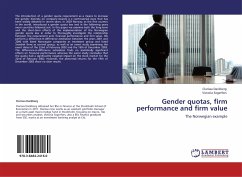The introduction of a gender quota requirement as a means to increase the gender diversity on company boards is a controversial issue that has been widely debated in recent years. In 2003 Norway, as the first country in the world, introduced a gender quota law and in the following years more countries followed suit. In this paper we examine both the long-term and the short-term effects of the implementation of the Norwegian gender quota law in order to thoroughly investigate the relationship between the requirement and, financial performance and firm value. We perform a difference-in-difference estimation between the years 2001 and 2006 with listed Norwegian companies as treatment group and listed Swedish firms as control group, as well as an event study examining the event dates of the 22nd of February 2002 and the 19th of December 2003. The difference-in-difference estimation finds no statistically significant effects on financial performance whereas the event study concludes that the quota had a significantly negative impact on the stock market for the 22nd of February 2002. However, the abnormal returns for the 19th of December 2003 show no clear results.
Bitte wählen Sie Ihr Anliegen aus.
Rechnungen
Retourenschein anfordern
Bestellstatus
Storno








